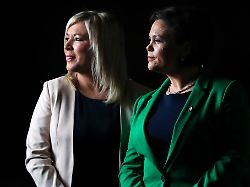End of the political crisis?
Regional election could boost Irish reunification
February 3, 2024, 8:37 a.m
After two years of blockade by the Protestant DUP party, Saturday’s regional elections could now lead Northern Ireland out of the crisis: With the predicted victory, the Catholic republican party Sinn Féin is moving closer to its goal of reunifying Ireland.
Northern Ireland is facing a historic vote in the regional parliament. This Saturday, Michelle O’Neill is to be elected head of government for the first time in the 103-year history of the British province. She is actually aiming for unification with EU member Ireland. The election also ends the political crisis in the former civil war region – exactly two years to the day after the previous government collapsed. O’Neill’s Catholic republican party Sinn Féin received the most votes for the first time in the most recent regional elections in May 2022 – but cannot freely choose its government partner.
Northern Ireland’s finely balanced political system requires the strongest forces from both sectarian camps to form a unity government. This is set out in the Good Friday Agreement, which ended the decades-long civil war in 1998.
DUP ends blockade
The largest Protestant party, the DUP, which advocates political union with Great Britain and has previously been the head of government, refused to cooperate. She ultimately called for an end to all customs controls between Northern Ireland and the rest of the United Kingdom, which the British central government in London and the EU had agreed on after Brexit. Only after long negotiations did the DUP agree to a new document a few days ago.
In the future, internal British controls should be reduced to a minimum. The Times newspaper wrote that the deal between London and the DUP was largely symbolic. Sinn Féin sees the upcoming, historic inauguration of 47-year-old O’Neill as a major step towards its political goal. A united Ireland is “within reach,” said Sinn Féin President Mary Lou McDonald. The party that was once seen as the political arm of the terrorist organization IRA is also the strongest force in the Republic of Ireland. There, however, two liberal-conservative parties with a coalition are preventing participation in the government.
Shortly before reunification?
In surveys, there is great skepticism on the Northern Irish side. The Irish Times newspaper found at the end of 2023 that only 30 percent would be in favor of unification in a referendum, but 51 percent would be against it. In Ireland, approval is almost two thirds. In principle, the Irish leadership is also striving for a merger. “I believe we are on the way to unification, I believe that there will be a united Ireland in my lifetime,” Prime Minister Leo Varadkar said in September 2023 – triggering sharp criticism from London.
The demographics favor Republicans. For the first time, there are more Catholics living in Northern Ireland than Protestants, a 2021 census has shown. As of now, it doesn’t look like this will change again. The area was founded in 1921 after the Irish Civil War expressly as a home for those who wanted to continue to be part of Great Britain – and the majority were Protestants. Experts believe that this makes the Unionists insist on their positions all the more intensely. There were riots in Belfast and other cities in protest against the special Brexit rules. Loyalist militants first drove passengers out of buses and then set the vehicles on fire. DUP leader Jeffrey Donaldson now sees himself as the winner who has asserted the interests of his voters with the British government. But he admitted that he had not achieved all of his goals. It is not yet known how the EU Commission, which reached an agreement with the British government on customs controls, will assess the new document. You would actually have to agree to serious changes.
Loyalists criticize DUP leader Donaldson
The aim of the previous regulation was to avoid a “hard border” between Northern Ireland and the EU member Ireland after Brexit in order not to stir up new conflicts. But the implementation sometimes led to shortages of food, medicine and gardening products. Pets could no longer be taken on holiday to the UK. Loyalists feared that the controls would endanger the union with Great Britain.
Most parties in Northern Ireland welcomed the DUP’s return to power-sharing. But hardcore unionists are not convinced. The Traditional Unionist Voice (TUV) party as well as influential loyalist politicians and bloggers criticize that DUP leader Donaldson has sold out. In reality, Northern Ireland continues to depend on the laws of the EU, whose internal market and customs union the region de facto belongs to even after Brexit. Experts warn that Donaldson must be careful not to further splinter the unionist camp.
